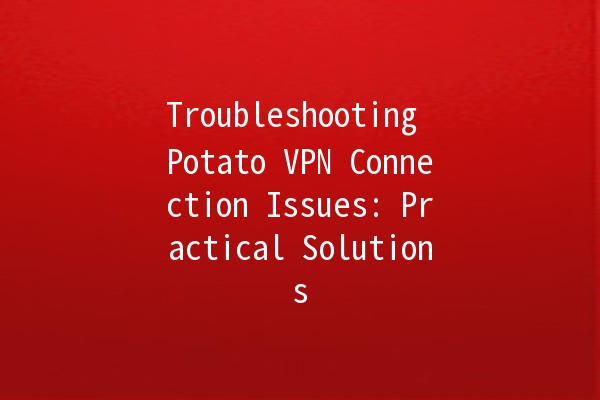In the digital age, finding a reliable Virtual Private Network (VPN) is crucial for ensuring online privacy and security. Among various options, Potato VPN has garnered attention for its simplicity and effectiveness. However, users may encounter connectivity issues with the Chinese version of Potato VPN. This article explores practical solutions to help you resolve these connection problems effectively, ensuring that your online experience remains uninterrupted.
Understanding Potato VPN Connection Problems
Before diving into solutions, it’s essential to understand the common reasons why Potato VPN might not connect. Users often report issues due to:
Recognizing these common challenges will help users troubleshoot the issues effectively.

5 Effective Tips to Enhance Potato VPN Connectivity
One of the most straightforward methods to resolve connection issues is to switch to a different server location within Potato VPN. Here’s how you can do it:
Open the App: Launch the Potato VPN application.
Select a Different Server: Navigate to the server list and choose a less crowded server.
Reestablish Connection: After selecting a different server, attempt to reconnect and see if the connectivity improves.
Reallife Example: A user from Beijing might experience slow speeds when connecting to a densely populated server in Shanghai. Switching to a less popular server in Guangzhou could lead to improved performance.
Another common issue arises from security software blocking the VPN connection. To address this, you can:
Temporarily Disable Firewall/Antivirus: Disable your firewall or antivirus software to see if it allows the VPN to connect.
Whitelist Potato VPN: If the VPN connects successfully, add it to the whitelist or exception list of your firewall/antivirus settings.
Reenable Security Software: After making the necessary adjustments, reenable your firewall or antivirus.
Reallife Example: A user’s firewall might be configured to block unrecognized applications. By adding Potato VPN to the exception list, the user can access the VPN without compromising their security.
Using an outdated version of Potato VPN can result in bugs and connectivity issues. To ensure optimal performance, follow these steps:
Check for Updates: Regularly check the app store or the Potato VPN website for updates.
Enable Automatic Updates: If possible, enable automatic updates to ensure you’re always using the latest version.
Reinstall the App: If issues persist after updating, consider uninstalling and reinstalling the application.
Reallife Example: A user might have encountered connectivity problems due to an outdated app version. After updating to the latest version, the user found that the application connected seamlessly.
Sometimes, the problem lies not with the VPN or the app but with your device’s network settings. To optimize your settings:
Forget the Current Network: Go to your device's WiFi settings and forget the network you are connected to.
Reconnect to the Network: Reenter the WiFi password and reconnect.
Reset Network Settings: If issues persist, consider resetting your network settings to default.
Reallife Example: After adjusting network settings, a user found a substantial improvement in their VPN connection speed.
In rare cases, your Internet Service Provider might impose restrictions on VPN traffic. If all troubleshooting efforts fail, consider:
Contacting Your ISP: Reach out to your ISP to inquire if they are blocking VPN traffic.
Inquiring About Changes: Ask if there have been recent changes to their policies regarding VPN usage.
Switching ISPs: If restrictions exist and are hindering your connectivity, you might consider switching to a different ISP that has more lenient policies regarding VPN usage.
Reallife Example: A user discovered that their ISP was intentionally throttling VPN connections. After switching ISPs, the user experienced consistent connectivity.
Common Questions About Potato VPN Connection Issues
Several reasons could prevent you from connecting to Potato VPN, including server overload, firewall interference, outdated software, incorrect network settings, or ISP restrictions. Identifying the root cause is essential for troubleshooting effectively.
To determine if a Potato VPN server is down, you can visit the Potato VPN community forums or check server status websites. Additionally, if multiple users report connectivity issues with a specific server, it may be temporarily down or overloaded.
If changing the server does not resolve the issue, consider checking your firewall and antivirus settings, ensuring the Potato VPN app is updated, modifying your network settings, or contacting your ISP for potential restrictions.
Yes, you can enhance your VPN connection speed by connecting to a nearby server, using a wired connection instead of WiFi, and ensuring that no other applications are using significant bandwidth while you try to connect.
Potato VPN’s usage policy typically allows for simultaneous connections, but this may vary. Check the official guidelines or your subscription type for specific details regarding simultaneous connections.
If Potato VPN keeps disconnecting, ensure your internet connection is stable, check your device’s network settings, and consider switching to a different server. Additionally, look into firewall settings and ensure the app is updated to the latest version.
By following these practical solutions, you can troubleshoot and resolve connection issues with Potato VPN effectively, ensuring a smoother online experience. Whether it’s switching server locations or adjusting network settings, these tips can help enhance your VPN connectivity.